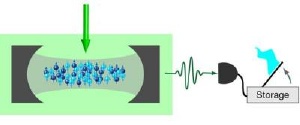Jul 20 2009
Scientists at MIT have figured out a key step toward the design of quantum information networks. The results are reported in the July 20th issue of Physical Review Letters and highlighted in APS's on-line journal Physics.
 Scientists at MIT have figured out how to relay the successful storage of light in a a form of quantum memory based on a cold-atom gas. Credit: Image copyright American Physical Society [Illustration: Alan Stonebraker]
Scientists at MIT have figured out how to relay the successful storage of light in a a form of quantum memory based on a cold-atom gas. Credit: Image copyright American Physical Society [Illustration: Alan Stonebraker]
A quantum network – in which memory devices that store quantum states are interconnected with quantum information processing devices – is a prototype for designing a quantum internet. One path to making a quantum network is to map a light pulse onto nodes in a material system. Yet, it is one thing to catch a beam of light; it is more difficult to generate a signal that heralds that it has been successfully caught. Quantum systems follow Heisenberg's rule that observing an event may destroy it, so the system has to emit just the right kind of herald pulse so as not to erase the data.
Now, Haruka Tanji, Saikat Ghosh, Jonathan Simon, Benjamin Bloom, and Vladan Vuletic from MIT have demonstrated an atomic quantum memory that heralds the successful storage of a light beam in a cold atom gas. The atomic-ensemble memory can receive an arbitrary polarization state of an incoming photon, called a polarization qubit, announce successful storage of the qubit, and later regenerate another photon with the same polarization state. The herald signal only announces the fact the pulse has been captured, not details of the polarization, so the quantum information is preserved.
This capability will likely benefit scalable quantum networking, where it is crucial to know if operations have succeeded.